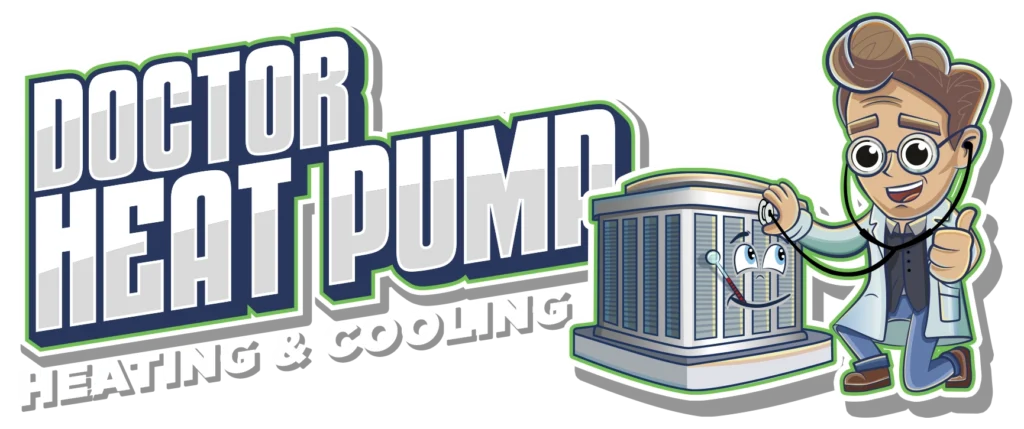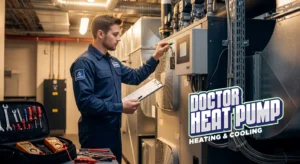Looking to cut costs while keeping your home comfortable? Learn how to get a tax credit for a heat pump and unlock savings while embracing eco-friendly heating and cooling.
Why Choose a Heat Pump?
Heat pumps are a game-changer when it comes to keeping your home or business comfortable. They don’t just heat or cool—they move heat efficiently, making them perfect for hot, dry climates like Las Vegas.
Efficiency That Pays Off
Instead of generating heat like traditional furnaces, heat pumps transfer it. This process uses less energy, resulting in lower utility bills. Plus, they seamlessly switch between heating and cooling, keeping your home comfortable all year.
Eco-Friendly Heating and Cooling
Heat pumps don’t rely on fossil fuels, reducing carbon emissions and supporting sustainability. If you’re looking for an energy-efficient way to maintain indoor comfort, a heat pump is the smart choice.
| Feature | Benefit |
|---|---|
| Moves Heat | Reduces energy use |
| Dual-Purpose | Handles both heating and cooling |
| Green Choice | Lowers carbon footprint and energy costs |
How Heat Pumps Save You Money
While heat pumps may have a higher upfront cost, they provide significant long-term savings on energy bills. Here’s how they stack up against traditional HVAC systems:
| Cost Factor | Traditional Systems | Heat Pumps |
| Installation | Lower upfront cost | Higher initial investment |
| Maintenance | Frequent servicing | Minimal upkeep |
| Energy Use | High consumption | Energy-efficient |
| Utility Bills | Expensive | Up to 30% savings |
| Long-term Value | Less efficient | More cost-effective |
By using electricity instead of burning fuel, heat pumps offer a cleaner, more affordable way to heat and cool your home. This efficiency can lead to up to 30% savings on energy bills—a win for both your wallet and the environment.
How to Get Tax Credit for Heat Pump
Upgrading to an energy-efficient heat pump doesn’t just save on energy costs—it can also qualify you for valuable tax credits. The federal government offers incentives to encourage homeowners to make eco-friendly upgrades.
Eligibility Requirements
To qualify for a heat pump tax credit, you must:
- Install an energy-efficient heat pump in your primary residence (not a rental or vacation home).
- Choose a model that meets Department of Energy (DOE) efficiency standards.
-
Purchase the system within the eligible time frame specified by the IRS.

Be sure to keep all receipts and paperwork for proof of purchase when filing your taxes. Consulting a tax expert can help ensure you claim the maximum credit available.
How Much Can You Claim?
The tax credit amount depends on the type of heat pump installed:
| Heat Pump Type | Tax Credit Percentage | Maximum Claim Amount |
| Air Source Heat Pump | 30% | Up to $2,000 |
| Geothermal Heat Pump | 26% | No limit! |
| Dual-Fuel Heat Pump | 25% | Up to $1,500 |
Additional Cost Savings and Incentives
Beyond federal tax credits, many states and utility companies offer rebates for installing energy-efficient heat pumps. Check local incentives in areas like Las Vegas, where energy-efficient upgrades are highly encouraged due to extreme temperatures and high energy demands.
In addition to financial incentives, a heat pump can increase the resale value of your home. Homebuyers are increasingly looking for energy-efficient features, making your investment even more worthwhile.
Installing a Heat Pump in Desert Climates
Heat pumps are becoming increasingly popular in desert areas like Phoenix and Las Vegas, where energy efficiency is key. Their ability to handle extreme temperature swings makes them a practical and cost-effective solution for year-round comfort.
| Climate Type | Heat Pump Efficiency (SEER) |
| Desert | 18 – 23 |
| Humid | 16 – 20 |
| Mild | 15 – 18 |
Not only do they cool effectively in scorching heat, but they also provide energy-efficient warmth during chilly desert nights.
Heat Pump Maintenance and Longevity
To maximize the benefits of your heat pump, regular maintenance is essential. While heat pumps require less upkeep than traditional HVAC systems, routine servicing can extend their lifespan and maintain peak efficiency.
Maintenance Tips:
- Clean or replace air filters regularly.
- Keep the outdoor unit clear of debris.
- Schedule annual professional inspections.
- Ensure proper insulation to reduce energy loss.
A well-maintained heat pump can last 15-20 years, making it a long-term investment in energy efficiency and cost savings.
Final Thoughts: Is a Heat Pump Right for You?
If you’re considering a heat pump, think about both cost savings and environmental impact. While the initial investment may be higher, the long-term benefits—lower energy bills, tax credits, and a reduced carbon footprint—make it a smart financial and eco-friendly choice.
By switching to a heat pump, you’re not only making your home more efficient but also taking advantage of valuable government incentives. Now that you know how to get a tax credit for a heat pump, you can start saving money while staying comfortable year-round.
Ready to Install a Heat Pump? Contact Doctor Heat Pump Today!
If you’re ready to enjoy energy-efficient heating and cooling while maximizing your tax savings, contact Doctor Heat Pump today! Our team of experts will help you choose and install the perfect heat pump for your home. Call us now to schedule your consultation!






